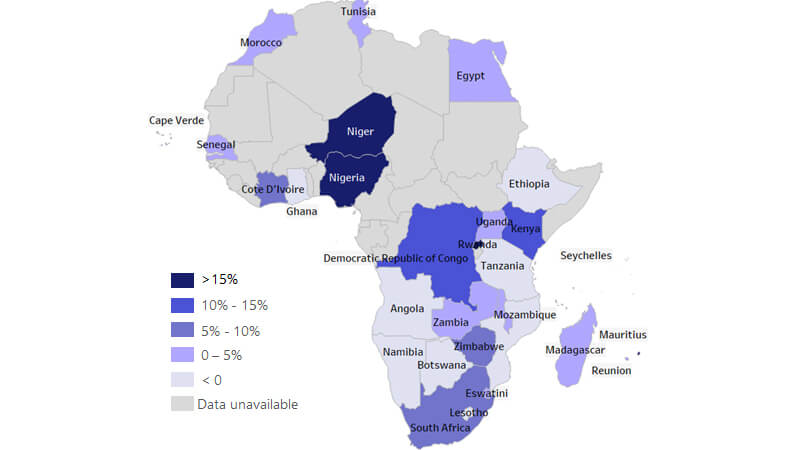March 10, 2021 – The dramatic events of last year have brought forward three to four years’ worth of digital transformation into just a few months as people were forced to shelter in place and businesses shifted their day-to-day operations to digital channels.1 Africa was already on a trajectory of rapid digital transformation before the COVID-19 crisis hit. It is very likely that the pandemic will only accelerate this pre-existing trend as it unlocks further untapped opportunities, with more people getting connected and gaining access to digital services. Key macroeconomic and demographic trends, such as wider technological adoption, rebounding economic activity, rising income levels and growing, young populations will only reinforce the rapid digital transformation in Africa going forward.
The last billion connections: Africa’s e-commerce potential
COVID-19 accelerated the digital transformation in Africa
Africa was undergoing a major digital transformation in recent years as more and more people connected to the internet and subscribed to mobile services for the first time. Between 2010 and 2018, the percentage of the population with internet access in Sub-Saharan Africa (SSA) increased by more than three fold, reaching 25 percent by 2018, while the share of the population with a mobile subscription surged from 44 percent in 2010 to 76 percent in 2018.2
The pandemic has only accelerated this trend by highlighting the importance of social and economic connectivity amidst all the restrictions on mobility and movement last year. However, despite rising technological adoption rates, Africa still lags the global average of internet (50 percent) and mobile (104 percent) penetration rates as of the end of 2018.3
The pandemic accelerated the uptake of e-commerce
While internet and mobile subscriptions continued to grow in Africa in recent years, e-commerce in general was slow to gain traction and was hobbled by various challenges, ranging from consumer preference for in-person shopping, slow delivery times, logistical issues and informal home addressing systems. But the various stay-at-home orders last year meant many consumers shifted to digital channels out of necessity with the closure of brick-and-mortar shops.
Just like the rest of the world, once the COVID-19 crisis hit Africa, countries around the region introduced various forms of lockdowns to mitigate the impact of the virus. As a result, the restrictive measures have led millions of people in Africa to depend on digital platforms for shopping, work, entertainment, education and healthcare. The 2020 gains in African e-commerce compared favorably to the increase in online retail sales as a share of total sales in more economically advanced regions and were higher than many other emerging markets. Within Africa, Nigeria, Niger, Rwanda and Mauritius led the gains, followed by Kenya and Democratic Republic of Congo.
That Africa has been able to pivot so successfully to greater use of the online sales channel is all the more remarkable given the fragmentation and informality of its retail sector. With the exception of South Africa, the majority of commerce in Africa occurs in informal markets, accounting for 85.8 percent of total employment, according to the International Labor Organization.4 Pre-pandemic, business-to-consumer (B2C) e-commerce platforms reach did not extend much further than urban middle- and upper-class consumers.
The secret to Africa’s pivot to greater e-commerce sales was the faster growth in business-to-business (B2B) sales, which layers online sales onto of the existing network of informal retailers rather than supplanting them. SSA’s B2B e-commerce platforms thrived because they overcame issues of consumer trust and logistics by working with and tapping into the informal markets, rather than working around these sales channels. This allowed the B2B platforms to provide goods beyond urban areas and well into remote regions. The majority of SSA consumers purchased from the informal shops and over time have built a trusted relationship with them. That is why some informal shops provide loan services to their loyal customers. Informal retailers order goods through their mobile phones. These informal shops who know their customers very well continue to act as the middle-man between consumers and the B2B e-commerce companies.
More highlights:
- Consumers quickly shifted to digital channels – and remained there
- Economic and demographic factors support the digital transformation
- COVID-19 Economic Impact Index
E-commerce sales by retailers advanced across Africa, as the pandemic led to reduced in person sales: (Q4 2020 vs Q4 2019 change in the card not present (CNP) retail trade as a share of total sales)

Forward-Looking Statements
This report contains forward-looking statements within the meaning of the U.S. Private Securities Litigation Reform Act of 1995. These statements are generally identified by words such as “outlook,” “forecast,” “projected,” “could,” “expects,” “will” and other similar expressions. Examples of such forward-looking statements include, but are not limited to, statements we make about Visa’s business, economic outlooks, population expansion and analyses. All statements other than statements of historical fact could be forward-looking statements, which speak only as of the date they are made, are not guarantees of future performance and are subject to certain risks, uncertainties and other factors, many of which are beyond our control and are difficult to predict. We describe risks and uncertainties that could cause actual results to differ materially from those expressed in, or implied by, any of these forward-looking statements in our filings with the U.S. Securities and Exchange Commission (SEC). Except as required by law, we do not intend to update or revise any forward-looking statements as a result of new information, future events or otherwise.
Disclaimer
Studies, survey results, research, recommendations, opportunity assessments, claims, etc. (the ‘Statements’) should be considered directional only. The Statements should not be relied upon for marketing, legal, regulatory or other advice. The Statements should be independently evaluated in light of your specific business needs and any applicable laws and regulations. Visa is not responsible for your use of the Statements, including errors of any kind, or any assumptions or conclusions you might draw from their use.